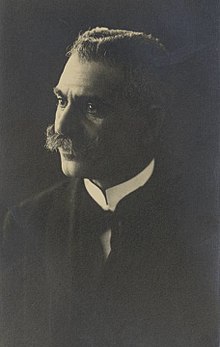This article has multiple issues. Please help improve it or discuss these issues on the talk page. (Learn how and when to remove these messages)
|
David Yudilovitz (Hebrew: דוד יודילוביץ; 1863–1943) was a Zionist activist with the Hovevei Zion and teacher in Rishon Le-Zion. He was a friend and colleague of Eliezer Ben-Yehuda.
David Yudilovitz | |
|---|---|
 Yudilovitz c. 1930s | |
| Born | 1863 |
| Died | 1943 |
| Nationality | Jewish |
| Occupation(s) | Zionist activist, Teacher |
| Known for | Involvement in the Hovevei Zion, contributions to Jewish national culture in Palestine, association with Eliezer Ben-Yehuda |
Biography
editYudilovitz settled in Palestine in 1882 with the Bilu'im during the First Aliyah. He compared the state of the Yishuv following the First Aliyah to "the time of the building of the Tower of Babel". Within the Yishuv he joined a small circle of committed activists who pursued the goal of a national culture for Jews. Owing to their activism, this process was underway by the time World War I started.
Yudilovitz was one of the Zionist activists who saw the value of a national culture at a time the Yishuv lacked a unified national character. The diversity and difference within the Jewish community of Palestine after the First Aliyah was a crisis that could not be resolved by a Jewish return to the land without the cultural foundation for a nationalist solution to the ethnic, cultural and linguistic heterogeneity that many were dissatisfied with in Jewish Palestine.[1]
References
edit- ^ Saposnik, Arieh Bruce (2008). Becoming Hebrew: The Creation of a Jewish National Culture in Ottoman Palestine. Oxford University Press. pp. 23–24.
Yudilovitz...was part of a small circle in the Yishuv that was devoted to transforming this melange into what they hopes would be a unified and homogenous national whole. The ultimate goal of their activity was the creation of a national culture...It was a culture that was in many senses both a reaction against and a direct outgrowth of a number of salient factors in Jewish life around the turn of the century, including a profound sense of crisis in the Yishuv itself...For those Jews who pinned their hopes for a reconstitution of Jewishness on a transfer of the geographical center of gravity in Jewish life to Palestine, the diversity (or disunity as many saw it) of Palestine's Jewish community stood out as a leading source of dissatisfaction)...the sense of crisis and despair that characterized the Yishuv in these early years of the 20th century is a well-documented and familiar feature of both memoirs and historical works...the national culture that the Yishuv's activists would conceive and whose infrastructure they would then lay during the prewar decade was envisaged in large measure as a homogenizing corrective to this ethnic, cultural and linguistic heterogenity...successive waves of immigration (known collectively in Zionist historiography as "the first Aliya") combined with certain modernizing tendancies among some of the more veteran residents of Jewish Palestine to plant the first seeds of a modern Jewish nationalism